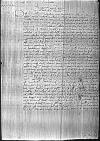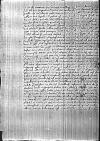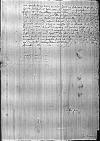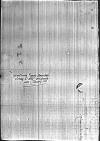1525-05-04⌊Heri1525-05-04⌋, cum essem apud ⌊magnum cancellarium⌋ illumque de rebus ⌊Moscorum⌋ et quibus modis inter eos et ⌊Maximilianum divum caesarem⌋ quaedam facta fuit amicitia, ac de istius gentis moribus et perfidia, quantum memini, certiorem redderem, allatae mihi sunt ⌊⌋ Maiestatis Vestrae Serenissimae ⌊Cracoviae⌋ 1525-03-13⌊13 Martii1525-03-13⌋ scriptae. ⌊⌋ cum mecum ter quaterque exosculatus in hospitium detulissem atque avide perlegissem, tanto subinde affectus sum gaudio, quanto prius numquam, fluctuatus utpote ingentibus animi procellis, tandem in portum relatus. Misi itaque post omnium perlectionem statim ad ⌊dominum cancellarium⌋, ut me in colloquium certo et opportuno tempore admitteret, quod pro sua humanitate in 1525-05-05⌊hodiernum1525-05-05⌋ disposuit, ut una hora ante prandium eum convenirem illudque post negotia cum eo sumerem. Cum autem haec posta ante hunc nostrum conventum sit abitura, commode se mihi obtulit, ut saltem hoc unum Maiestati Vestrae Serenissimae significarem, me totum litterarum fasciculum sicut Cracoviae conclusus et inceratus fuit integrum accepisse meque omnem daturum operam, quantum eniti possum, ut mandatis Maiestatis Vestrae Serenissimae satisfiat, deinde cum primis postis uberius de omnibus scripturus. Quae tamen hic aguntur, quantum temporis suppetit, brevibus perstringam. Scripsi 9 mensis praeteriti de rebus Prutenis ea, quae a nuntio domini magistri intellexeram et de ingressu Moscorum ac de aliis, quae tunc hic in novis habebantur, interea parum est immutatum. ⌊Maiestas caesarea⌋ velit huc cogere regnorum istorum conventum, quem “curtas” vocant, ut de rebus suis statueret, praesertim quomodo ⌊Italiam⌋ ingredi posset, opusque esset ad hoc iter largo viatico; sed adhuc de istis “curtis” nihil hic intellegitur. Galli ad nullas condiciones propositas volunt descendere nisi ad pecuniariam regis sui redemptionem, conscribuntque gentes et faciunt exercitus, ut se tueantur. Fertur etiam, insignis quidam Gallorum orator huc venturus, fortassis mitius iste aget, impetus enim Gallorum primi solent esse acerrimi, sed ubi refrixit animus, cinerantur. Venturi huc sunt etiam duo magni regis Angliae oratores, congratulatum,
ut ab isto oratore, qui hic agit, intellexi, de hac victoria caesaris; sunt tamen, qui suspicantur, quod ad tractandum pro liberatione regis Galliae et ad aliquam pacem componendam huc mittantur. In Anglo tota adhuc res haeret. Captus est etiam paulo ante regis Galliae orator cum litteris, qui ante hunc conflictum ad Mauros contra caesarem sollicitandos fuit missus, quod illi non parum in hac sua afflicta fortuna officiet. Nondum istarum rerum videmus exitum. Oratores statuum Italiae multa pollicentur bona, sed omnis potentia solet esse invisa istis praecipue hominibus. Hic adhuc quemadmodum prius nihil aliud quam nervus deficit, qui si haberi posset, finis certe huius esset tragoedie fieretque tandem contra infideles aliquid, ad quod profecto caesar egregium prae se fert animum, factusque est post hanc tam longam suam aegritudinem et corpore et animo validior, soletque si pacem certam habere posset, praedicare, se vires suas contra Christi nominis hostes conversurum omnino. Quod Deus aliquando faxit etc.
Secunda die huius mensis ⌊maiestas sua caesarea⌋ ⌊Moscos⌋ audivit iisque usus est caerimoniis. Misit pro eis more solito ducem et factorem eorum Antonium de Comitibus, et cum advenissent neque assurrexit neque tegmen capitis movit; illi inclinationes facere et pileos pinnatos deponere et rursus imponere induti in hoc hic ingenti aestu binis et ternis vestibus pelliceis sudantesque plurimum, maiestatem suam sunt allocuti. Eratque scamnum dispositum panno aureo contectum, in quo sedere debebant, sed cum visi sunt pileos suos rursus imponere capitibus, stantes coacti sunt perorare, locutusque est eorum interpres Latinum, quod nemo intellexit. Qua de re dominus cancellarius, ut 1525-05-04⌊heri1525-05-04⌋ mihi retulit, subito discessit. Et sic non intellecti abierunt. Postero die per factorem eorum in scriptis dabant omnia. Mihi, qui nullam a Maiestate Vestra Serenissima commissionem habeo, loqui non licet, non possum tamen mihi temperare, quin interdum non ut orator, sed ut privatus ex me ipso loquar et quaerentibus de illis respondeam. 1525-05-04⌊Heri1525-05-04⌋, ut scripsi, cum essem apud ⌊dominum cancellarium⌋, inter alia mihi dixit, si velim cum eo et vicinis meis Rutenis prandere, invitassent enim se ipsos ad prandium. Respondi, quod nollem illius mensae hilaritati esse impedimentum, nam certo illos scirem, me praesente, cuius dominum timerent, laetos non futuros. Discessique ad laetius prandium cum litteris Maiestatis Vestrae Serenissimae in deversorium meum. Postea dominus cancellarius cogebatur istos nebulones exspectare diutius, intellexerant enim, me illic fuisse nolebantque venire, nisi certo scirent me ibidem non futurum. Intellexi, quod egregie poti, nam ex maioribus crateris biberant, cum omnium admiratione ex hoc symposio abierunt plus in recessu quam in fronte dedecoris relinquentes. Quid hic egerunt, cum primis diffusius scribam. Alia pro hac temporis angustia non restant. Commendo me suppliciter Maiestati Vestrae Serenissimae, ut Domino meo clementissimo illique eas, quas pectoris mei exiguitas potest, gratias habeo, quod mei est misertus et me scriptis suis ab inferis reduxit.



